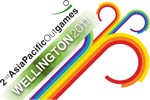Outgames opening

I begin by greeting everyone in the languages of the realm of New Zealand, in English, Māori, Cook Island Māori, Niuean, Tokelauan and New Zealand Sign Language. Greetings, Kia Ora, Kia Orana, Fakalofa Lahi Atu, Taloha Ni and as it is the early evening (Sign)
I specifically greet you: Virginia Hopkins-Burns and David Hindley, co-chairs of the 2nd AsiaPacific Outgames; Peter Sagar, President of the Asia Pacific branch of GLISA, the Gay and Lesbian International Sports Association; Your Worships Celia Wade-Brown, Mayor of Wellington and Jenny Rowan Mayor of Kapiti; Your Excellency David Huebner, Ambassador of the United States to New Zealand; Grant Robertson and Kevin Hague, Members of Parliament; Michael Houlihan and Michelle Hippolite, Chief Executive and Kaihautu respectively of the Museum of New Zealand Te Papa Tongarewa; Professor Piri Sciascia Pro-Chancellor Victoria University of Wellington, Distinguished Guests otherwise; ladies and gentlemen.
Thank you for inviting my wife Susan and I to be here for the beginning of the 2nd Asia Pacific Outgames here in Wellington.
As Patron of the Games, I have been given the privilege to formally open this week of activities covering sport, culture and human rights. Before doing so I would like to briefly comment on the wider significance of why everyone is here.
At the outset, I would like to welcome everyone to Wellington and to New Zealand. In particular, that is directed to those have travelled a long way to reach here. I understand there are people from more than 20 countries represented here and I hope that after the Games some of you at least will have the opportunity to further explore our country.
In spite of the fact that people will compete in 16 different sports as part of the Outgames, this is more than a sports tournament. There is also a major cultural programme and a significant human rights conference. It is in the New Zealand tradition to be active in the arena of human, civil and political rights.
The ending of discrimination against gay and lesbian people is a journey in which New Zealand has played a role. It is needs to be seen as a part of a wider journey for the achievement of human rights. New Zealand can point with pride to being a founding signatory of the United Nations Charter and the Universal Declaration of Human Rights. New Zealand passed its first human rights legislation in 1977, and this development has continued with the addition, in 1993, of sexual orientation and disabilities as matters of unlawful discrimination. One of the proudest moments for me in the Governor-General role was to stand in the United Nations chamber in 2008 and receive, for the country, the Franklin Delano Roosevelt award which had been presented for the way in which our country deals with people with disabilities.
The journey is a long one because in 1893, New Zealand was the first country in the world to grant women the right to vote in national elections. That campaign was notable in being won through persuasion, with three petitions, each one larger than the one before being presented to Parliament . It is worth noting that when women went to place their first votes, within ten weeks of the legislation being enacted, there was no trouble at all.
The most prominent leader of the campaign for suffrage in New Zealand, Kate Sheppard, now graces our $10 note. A year after winning the right to vote, she was elected as the first President of the New Zealand Council of Women. She once famously said, on behalf of New Zealand women: “We are tired of having a sphere doled out to us and of being told that anything outside that sphere is ‘unwomanly’. We want to be natural just for a change … we must be ourselves at all risks.”
Two New Zealand women who have made a name for being natural and themselves as entertainers are Linda and Jools Topp. They are better known to to New Zealanders, at least as the Topp Twins and are one of the best loved duo acts in our country.
In a recent documentary feature film, Untouchable Girls, they looked backed to the role they played in the campaign for homosexual law reform, 25 years ago in 1986.
The Topp Twins decided to campaign for change by having fun. As Linda Topp put it: “We thought ‘Let’s show New Zealand that we are just normal people and we just want to have fun like everyone else. It’s not about sexuality in many ways – it’s about who you love.”
Just as New Zealand’s experience with votes for women showed that battles can be won by persuasion, The Topp Twins’ approach shows that campaigns on serious subjects can be won and won handsomely with humour.
That combination of broaching the serious issues and having fun at the same time, is evident in the schedule for the Outgames with its combination of sports, cultural events and a human rights conference.
I would like to take this opportunity to add congratulations to the organisers of the 2nd Asia Pacific Outgames who have clearly put in a great deal of work into preparation for this week’s activities.
It thus gives me great pleasure, as Patron, to declare the 2nd Asia Pacific Outgames here in Wellington officially open.
On that note anticipating competition, culture and discussion and not overlooking having fun, I will close in New Zealand’s first language Māori, by wishing you all good health and fortitude in your endeavours. No reira, tēnā koutou, tēnā koutou, kia ora, kia kaha, tēnā koutou katoa.
